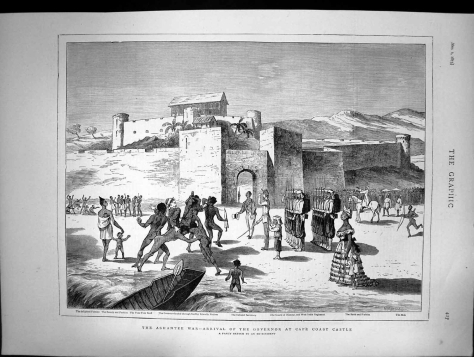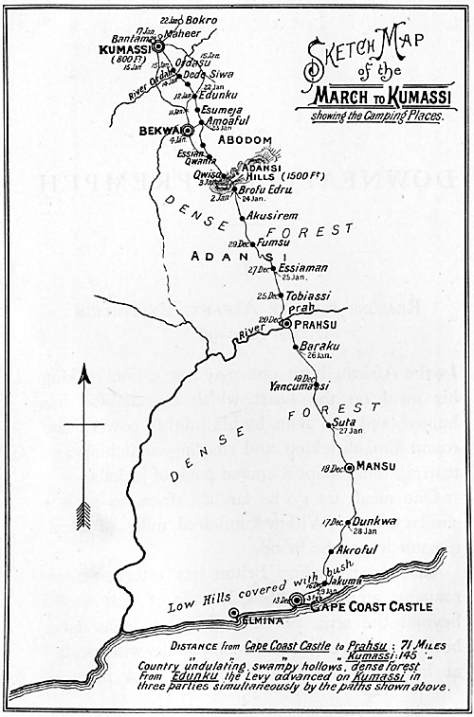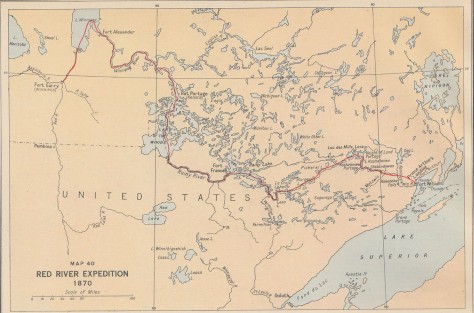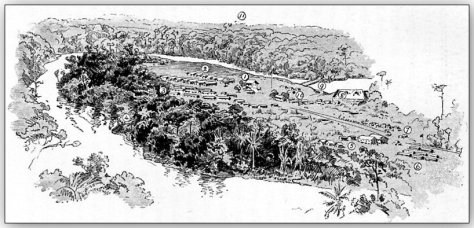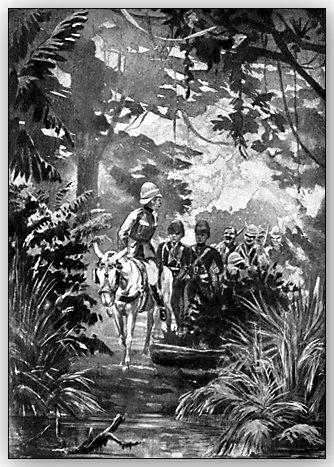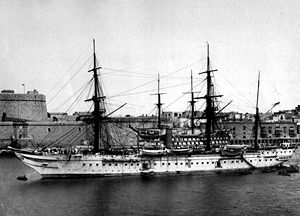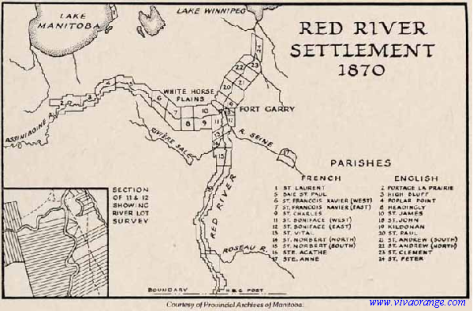“… Several of the oxen we brought from Collingwood have arrived to Prince Arthur with serious injuries and sickness. The most common wound has occurred when the animals gored each other while cooped up during the journey and some when their handlers move them into the nets to be lowered overboard into the shallow waters. There is yet no warf to dock our ships for disembarkation. In the excitement of their release from their holds their great bulky masses collide with each other the way water bounces around in a bucket. Their heads fling back towards their neighbours who have nowhere to turn for escape and so have their flanks or faces ripped deeply by thick horns. The illness that spreads through their numbers evidently is found in their intestines. And so the deck where men work the pullies and nets becomes shiny with blood and slippery from very foul stomach waste. Once the wounded and so useless individuals are walked over the nets, a young boy with a grey tunic holds a service rifle to his right shoulder and with a bewildered reluctance raises the muzzle to the temple of the moaning and wild-eyed creatures and pulls the trigger. The weather is the kind where I would love nothing better than to lay on the nearby field and feel on my face the warm late spring wind stream over the shore, cleansing myself from the horrible smell. …”
Sample (or proof?) draft of progress!
“… “Yes, yes, yes, but we will not succeed here directly as a result of the contributions from these natives. I can certain of that now. This is not Dawson’s trail, is it? And the indigenous population of this part of the world is nowhere near as sophisticated, both in culture and in intelligence, as the Half-breeds and Indians, as dim as they all are, that we had at our disposal for the march to Ft. Garry. While some of the Africans seem to have been exposed to Mohammedism, this is a rare instance only reserved for the very distant tribes of the northern savannah. And I’m sure monotheism of this sort will only be a positive influence, compared to the cannibalism the forest tribes all practice—but only in the long run will it help to increase their ability to read and write in Arabic. Bah—and that will not cure their laziness for our sakes right now! Only a small number of the Half-breeds and Indians earned our disfavor. The whole of them even took the Sabbath and were quite civil and useful really. When only our presence as British Regulars in Red River meant we were the tip of a broad sword of a contingent of Canadian volunteers, here, I’m afraid, we must not only demonstrate the willingness of England’s military by not only sailing the distance, but we must also carry the mortal burden ourselves and rely not on the African to go to war for us. Those half-minded monkeys will carry us to the battle, if we can properly motivate the beasts. Sadly, I’m afraid, we will be very fortunate if we can secure enough native levies to bring us to our enemy before we may punish him for his transgressions. Come, friends, let us finish this after we eat.” …”
Dialogue
Wolseley and his staff are gathered at Cape Coast Government House having just received a Durbar of Chiefs under the protection of the Queen of England. He has the ear of the men that served with him in Red River and he is explaining how determination led to their victory of the real enemy in Red River: the forests, swamps, and rivers of the created world. The firmament is fully under the control of the modern age, and the military must be able to conquer the field of war before it will ever dominate its strategic foe.
Man vs. Nature
“…you have done good service to the State, and have proved that no extent of intervening wilderness, no matter how great may be its difficulties, whether by land or water, can enable men to commit murder or to rebel against Her Majesty’s authority with impunity.”
Sir Garnet Wolseley, Colonel, Commanding Red River Expedition
Ft. Garry, 28 August, 1870
Greetings,
Wolseley did much to consolidate British forces and rally native allies on the Gold Coast to pursue colonial policy on the Gold Coast before burning Kumasi to the ground. He raised thousands of local militia (but had much trouble securing their actual service, blaming, in oh-so-racist language, the “cowardly and lazy” constitution of Africans) and ordered the survey of roads and infrastructure to service the expedition to Kumasi.
Interestingly to my book, he added several officers from the 1870 Red River Expedition in his mission to Kumasi in Jan 1874. The memoirs of Baden-Powell and Rathbone Low especially point to his Wolseley’s meticulous planning, made famous in Manitoba, perfected in Ashanti, and relied upon in future monumental feats of British manoeuvre, such as in Sudan along the Nile.
The real enemy was the forest. The rapids. The heat. The bugs.
The natural boundary separating his force from the enemy in West Africa was the Prah River; and, like on the Dawson Trail to Shebandowan and Lake on the Woods in Manitoba, Wolseley ensured the route to this objective was navigable. He ordered men to build miles of corduroy roads, repair and construct hundreds of bridges, and erect supply and barrack stations from materials gathered from the impenetrable forests.
At his encampment at Prahsu, along the banks of the Prah, Wolseley enjoyed the company of the advanced British detachment and native levies around a vast night-fire, singing songs like these:
I suggest that, here, while deep in the ‘primordial’ forest of humanity, Wolseley penned a letter for courier to Cape Coast for the next mail ship to Plymouth. He will remember his previous campaign to the Red River, and how victory over the terrain in Canada only proved his abilities and British right to victory against Ashanti. In so many of the records, Wolseley’s real enemy was the environment he faced daily before even firing a shot (Riel evacuated Ft. Garry before Wolseley arrived). WIth him were a core cadre of elite soldiers that Wolseley came to trust and celebrate. Carrying on about the career soldiers who served in Canada and W/Africa and beyond, these men became know later as The Ashanti Ring:
My premise remains that Wolseley and his crew learned and perfected their skills, as we all do, from their previous work experience. And in the case of the Ashanti Ring, become utterly convinced of their abilities and of the need to pursue their callings in service of the Crown.
HMS Tamar (Victor Emmanuel)
HMS Samaritan
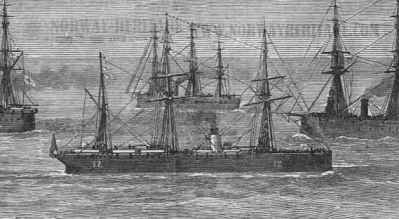
A troopship to the Gold Coast
HMS Himalayan
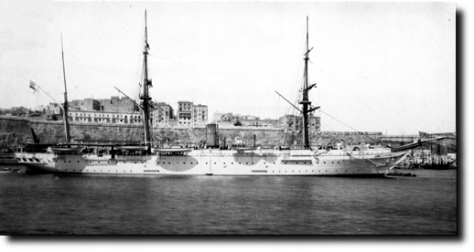
A troop carrier to the Gold Coast
Paused
My computer recently died. The hard-drive is toast. Now I have a new computer and can resume the work. Need to get it done!!
Red River Expedition
This will be a short note to share some of what details I have learned about the first third of Wolesely’s journey to Ft. Garry. It is as all the sources say: a huge feat of military manoeuvre and logistical planning. Of course, what I am interested in is measuring the lengths the political masters were willing to endure to plunge a fighting force into the wilderness. Fascinating the display of military power and determination.
The main source I’m in, “Correspondence relative…”, does a fantastic job at revealing the behind the scenes discussions about the planning and motivations of the RRE. In particular are the little quibbles about whether the Dominion or Imperial government will pay for a slight increase to the 60th Rifle Battalion Lindsay requests soon after the initial cost sharing agreements are made between the colonial and metropolitan decision-makers. The issue, in part, surrounds the view that any expedition of the magnitude RRE that will blaze a network of portages will in fact be laying the foundation for a crucial piece of infrastructure into a pioneer settlement along the Red River. Who should be shouldering the initial costs? Britain? Ottawa? In the end, the prior 1/4 agreement with Canada paying the majority of the costs endured.
Thoughts about “Correspondence relative to the recent Expedition to the Red River Settlement: with Journal of Operations”
The source is like all the other British Gov documents I’ve sifted through in my MA work on the Northern Territories of the Gold Coast. They’re routine, detailed, and steeped in administrative duty. This makes them great sources: their attempt at an almost scientific objectivity, since the posture of the writer’s mind is so administrative that a bias immediately jumps off the page. You can really read through the lines in bureaucratic records; the writers are doing a job and yet their selves always comes out eventually. We all know emotions are like that, never being contained or hidden for long before you’re over the sink trying to wash the blood off your hands. Good luck.
So far, I can share that the diplomatic correspondence between the levels of the Dominion Canadian government and the Imperial Government in Britain at either the War Office or the Colonial Office reveals the agreed need among all involved that the Red River Expedition needs to be “Imperial in character”. The various reasons, especially according to Lieutenant-Colonel James Lindsay, included wanting to bolster the morale of the largely volunteer militias that the Government of Canada was planning to field. In fact, this source indicates more than a few times that authorities had trouble recruiting members to completely fill Quebec Battalion. A familiar Canadian political story appears in the drama to ensure French and English Canadians play visible roles in the service of the Dominion and Imperial governments. Lindsay could only barely and almost too late mobilize the whole force for want of recruits from Quebec. The presence of professional soldiers from England would also send the message to the burgeoning Canadian public that government had the support of the Crown in maintaing peace and order in the Red River. Riel was, clearly, an enemy of the state, a murderer, and an insurrectionist in this document.

